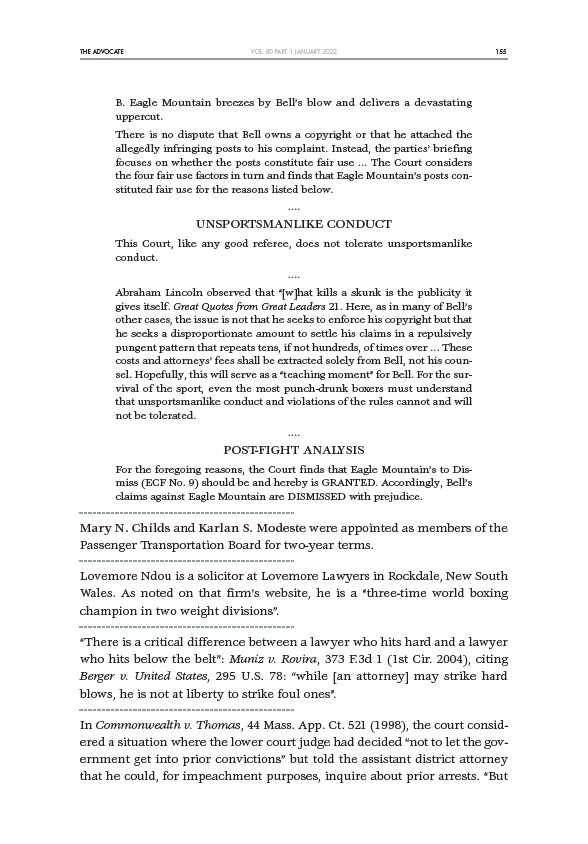
THE ADVOCATE 155
VOL. 80 PART 1 JANUARY 2022
B. Eagle Mountain breezes by Bell’s blow and delivers a devastating
uppercut.
There is no dispute that Bell owns a copyright or that he attached the
allegedly infringing posts to his complaint. Instead, the parties’ briefing
focuses on whether the posts constitute fair use … The Court considers
the four fair use factors in turn and finds that Eagle Mountain’s posts constituted
fair use for the reasons listed below.
….
UNSPORTSMANLIKE CONDUCT
This Court, like any good referee, does not tolerate unsportsmanlike
conduct.
….
Abraham Lincoln observed that “what kills a skunk is the publicity it
gives itself. Great Quotes from Great Leaders 21. Here, as in many of Bell’s
other cases, the issue is not that he seeks to enforce his copyright but that
he seeks a disproportionate amount to settle his claims in a repulsively
pungent pattern that repeats tens, if not hundreds, of times over … These
costs and attorneys’ fees shall be extracted solely from Bell, not his counsel.
Hopefully, this will serve as a “teaching moment” for Bell. For the survival
of the sport, even the most punch-drunk boxers must understand
that unsportsmanlike conduct and violations of the rules cannot and will
not be tolerated.
….
POST-FIGHT ANALYSIS
For the foregoing reasons, the Court finds that Eagle Mountain’s to Dismiss
(ECF No. 9) should be and hereby is GRANTED. Accordingly, Bell’s
claims against Eagle Mountain are DISMISSED with prejudice.
Mary N. Childs and Karlan S. Modeste were appointed as members of the
Passenger Transportation Board for two-year terms.
Lovemore Ndou is a solicitor at Lovemore Lawyers in Rockdale, New South
Wales. As noted on that firm’s website, he is a “three-time world boxing
champion in two weight divisions”.
“There is a critical difference between a lawyer who hits hard and a lawyer
who hits below the belt”: Muniz v. Rovira, 373 F.3d 1 (1st Cir. 2004), citing
Berger v. United States, 295 U.S. 78: “while an attorney may strike hard
blows, he is not at liberty to strike foul ones”.
In Commonwealth v. Thomas, 44 Mass. App. Ct. 521 (1998), the court considered
a situation where the lower court judge had decided “not to let the government
get into prior convictions” but told the assistant district attorney
that he could, for impeachment purposes, inquire about prior arrests. “But